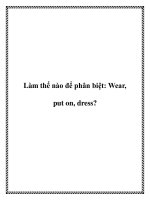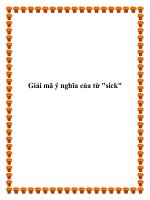Phân biệt nghĩa của từ 9 pdf
Bạn đang xem bản rút gọn của tài liệu. Xem và tải ngay bản đầy đủ của tài liệu tại đây (61.92 KB, 11 trang )
heighth
HEIGHTH
HEIGHT
“Width” has a TH at the end, so why doesn’t “height"? In fact it used to, but the standard pronunciation today ends in a plain “T” sound. People who use
the obsolete form misspell it as well, so pronunciation is no guide. By the way, this is one of those pesky exceptions to the rule, "I before E except after
C," but the vowels are seldom switched, perhaps because we see it printed on so many forms along with “age” and “weight."
List of errors
file:///C|/Temp/livres/commonerrors/errors/heighth.html03/09/2005 15:38:16
help the problem
HELP THE PROBLEM
HELP SOLVE THE PROBLEM
People say they want to help the problem of poverty when what they really mean is that they want to help solve the problem of poverty. Poverty
flourishes without any extra help, thank you. I guess I know what a “suicide help line” is, but I’d rather it were a “suicide prevention help line.” I
suppose it’s too late to ask people to rename alcoholism support groups as sobriety support groups, but it’s a shoddy use of language.
List of errors
file:///C|/Temp/livres/commonerrors/errors/help.html03/09/2005 15:38:16
hero/protagonist
HERO/PROTAGONIST
In ordinary usage “hero” has two meanings: “leading character in a story” and “brave, admirable
person.” In simple tales the two meanings may work together, but in modern literature and film the
leading character or “protagonist” (a technical term common in literary criticism) may behave in a
very unheroic fashion. Students who express shock that the “hero” of a play or novel behaves
despicably reveal their inexperience. In literature classes avoid the word unless you mean to stress a
character’s heroic qualities. However, if you are discussing the main character in a traditional opera,
where values are often simple, you may get by with referring to the male lead as the "hero"—but is
Don Giovanni really a hero?
See also “
heroin/heroine."
List of errors
file:///C|/Temp/livres/commonerrors/errors/hero.html03/09/2005 15:38:17
heroin/heroine
HEROIN/HEROINE
Heroin is a highly addictive opium derivative; the main female character in a narrative is a heroine.
List of errors
file:///C|/Temp/livres/commonerrors/errors/heroin.html03/09/2005 15:38:17
highly looked upon
HIGHLY LOOKED UPON
HIGHLY REGARDED
Many people, struggling to come up with the phrase “highly regarded,” come up with the awkward “highly looked upon” instead; which suggests that the
looker is placed in a high position, looking down, when what is meant is that the looker is looking up to someone or something admirable. List of errors
file:///C|/Temp/livres/commonerrors/errors/lookedupon.html03/09/2005 15:38:17
him, her/he, she
HIM, HER/HE, SHE
There is a group of personal pronouns to be used as subjects in a sentence, including “he,” “she,” “I,”
and “we.” Then there is a separate group of object pronouns, including “him,” “her,” “me,” and “us.”
The problem is that the folks who tend to mix up the two sets often don’t find the subject/object
distinction clear or helpful, and say things like “Her and me went to the movies."
A simple test is to substitute “us” for “her and me.” Would you say “us went to the movies?”
Obviously not. You’d normally say “we went to the movies,” so when “we” is broken into the two
persons involved it becomes “she and I went to the movies.”
But you would say “the murder scene scared us,” so it’s correct to say “the murder scene scared her
and me.”
If you aren’t involved, use “they” and “them” as test words instead of “us” and “we.” “They won the
lottery” becomes “he and she won the lottery,” and “the check was mailed to them” becomes “the
check was mailed to him and her.”
See also “
I/me/myself.”
List of errors
file:///C|/Temp/livres/commonerrors/errors/him.html03/09/2005 15:38:17
hippie/hippy
HIPPIE/HIPPY
A long-haired 60s flower child was a “hippie.” “Hippy” is an adjective describing someone with wide
hips. The IE is not caused by a Y changing to IE in the plural as in “puppy” and “puppies.” It is rather
a dismissive diminutive, invented by older, more sophisticated hipsters looking down on the new kids
as mere “hippies.” Confusing these two is definitely unhip.
List of errors
file:///C|/Temp/livres/commonerrors/errors/hippie.html03/09/2005 15:38:18
hisself
HISSELF
HIMSELF
In some dialects people say “hisself” for “himself,” but this is nonstandard.
List of errors
file:///C|/Temp/livres/commonerrors/errors/hisself.html03/09/2005 15:38:18
historic/historical
HISTORIC/HISTORICAL
The meaning of “historic” has been narrowed down to “famous in history.” One should not call a
building, site, district, or event “historical.” Sites may be of historical interest if historians are
interested in them, but not just because they are old. In America “historic” is grossly overused as a
synonym for “older than my father’s day."
List of errors
file:///C|/Temp/livres/commonerrors/errors/historic.html03/09/2005 15:38:18
an historic
AN HISTORIC
A HISTORIC
You should use “an” before a word beginning with an “H” only if the “H” is not pronounced: “An honest effort.” It’s “a historic event” and “a hysterical
scene.” However, a lot of sophisticated people like the sound of “an historical,” so it’s not likely to get you into trouble.
List of errors
file:///C|/Temp/livres/commonerrors/errors/an_historic.html03/09/2005 15:38:19
hoi polloi
HOI POLLOI
Hoi polloi is Greek for “the common people,” but it is often misused to mean “the upper class” (does
“hoi” make speakers think of “high” or "hoity-toity"?). Some urge that since “hoi” is the article “the
hoi polloi” is redundant; but the general rule is that articles such as "the” and “a” in foreign language
phrases cease to function as such in place names, brands, and catch phrases except for some of the
most familiar ones in French and Spanish, where everyone recognizes “la"—for instance—as
meaning “the.” “The El Nino” is redundant, but “the hoi polloi” is standard English.
List of errors
file:///C|/Temp/livres/commonerrors/errors/hoipolloi.html03/09/2005 15:38:19









